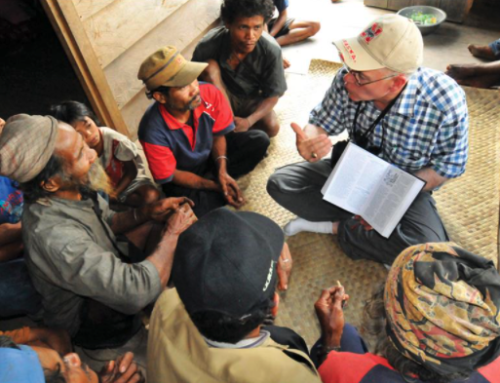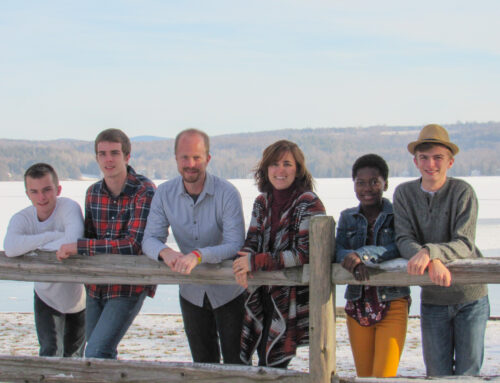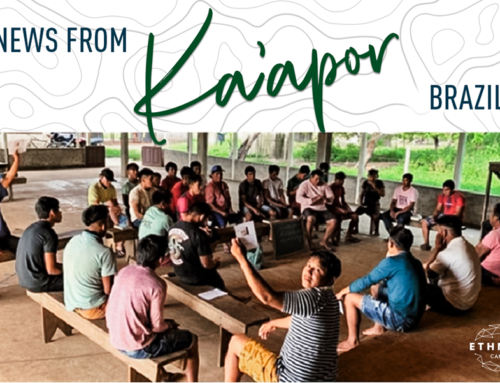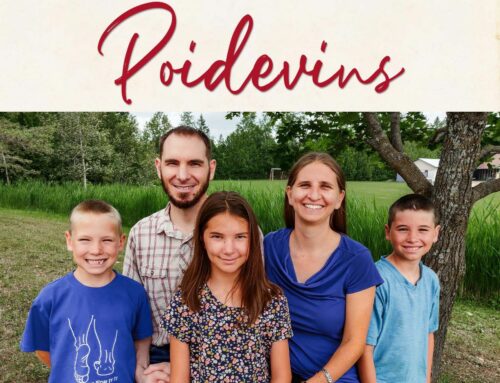A nine-hour hike to a distant village opens opportunities for eternal impact.
There is definitely, missionary Lourens Laureti says, adventure in his life.
Outreach journeys to outlying villages can be challenging to say the least and he regularly visits surrounding villages that are some distance away from the Mengen village that he and his family call home.
How far away are these other villages? Most of them involve at least a nine-hour hike. “We breathe sticky, humid air and sweat without stopping,” Lourens says.
So is this a lot like backpacking? “I always say it’s a muddy story that is not pleasant. There are no beautiful paths or rest points for picnics, no lookout points for enjoying scenery.”
Lately, Lourens has been hiking “without shoes, due to my hiking shoes being forgotten behind last time we visited our support centre.” So his feet are definitely worse for the wear after nine hours barefoot in muddy jungle terrain.
But all the hardships of the hike are forgotten when the destination is reached and he is met with warm hospitality and an eager welcome. The tribe directs Lourens to a hut to stay in for a few days.
He spends a little time on arrival in making the hut a little more livable. Relatively speaking. “The heat and humidity are much worse in windowless huts, and the rats and damp leaves provide a smell I cannot describe,” Lourens explains. “It’s really good that the hut is dark and I actually can’t see everything that’s in there.”
But never mind the hut itself. Lourens is here to visit the people. “There are these people who I came to visit and have grown to love so much over the years,” he writes. The dwellers of the village are clearly the purpose and the substance of Lourens’ visit.
“Do not think,” Lourens adds, “that I have this hut all to myself. No way. Always when I come there will be a great crowd of villagers who will give me no space. The concept of privacy does not exist for them. They will push through the door or creep in under the walls.”
Lourens travels light on these outreach hikes. A sleeping bag, a camera, a pen and notebook. And of course a toothbrush and toothpaste. “They love to try out everything that I have,” Lourens laughs, “and thus I have often shared my toothbrush.”
The villagers will build a fire in the centre of the hut—the traditional place for gathering to visit—and tell stories. Instead of sitting around visiting over cups of coffee, they will chew a koi nut mixture.
“We will visit and tell stories and chew away in that humid, smelly warm cabin around the fire,” he adds.
Soon the men will start announcing loudly that it’s dinner time. “This means,” Lourens shares, “sweet potatoes placed on the fire and maybe yesterday’s piece of pork and fat and some freshwater snails.”
After dinner, there is a re-gathering around the fire. Lourens explains, “And this is when we talk about deep issues … we speak about Who the true God is and what He is like and if we should be afraid of Him. We speak about whether He is far away or near and is He angry or does He love us. We speak about how we can be at peace with Him and get to know Him … and they ask why is it that the stories of their ancestors do not make sense and they ask about what is true. … We can talk on and on until dawn sometimes.”
At the dawn of a new day, the villagers urge him, “Come, Lourens, let’s go fishing and talk some more.” But Lourens is, by this time, exhausted.
“I decline and tell them to give me some time to sleep,” he says.
Because of one thing Lourens can be certain. That night to come will be another night of long visiting and story-telling.
So he retreats gratefully and wearily to his warm, damp hut that smells like rats and mold. It’s not that he is so fond of that village hut. But his heart swells with great love for the village people.
And Lourens is certain of something about these village outreach visits and he shares this certainty with joy and conviction.
“I know,” Lourens says, “that we are sowing seeds that will grow on into eternity.”






